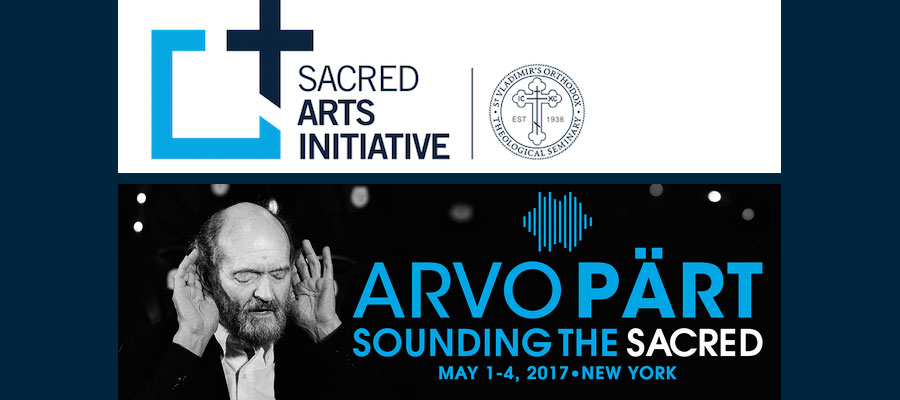Arvo Pärt: Sounding the Sacred, Fordham University, Lincoln Center, May 1–4, 2017
A conference of the Sacred Arts Initiative and the Arvo Pärt Project at St. Vladimir’s Seminary, in collaboration with the Orthodox Christian Studies Center of Fordham University.
We are pleased to announce an international conference to be held from May 1-4, 2017 in the heart of New York City’s vibrant Lincoln Center music scene. This event will bring together scholars from diverse fields (music, theology, sacred acoustics/sound studies, architecture, religious studies, philosophy, et al.), as well as artists experienced in the performance and recording of Pärt’s music, to create a unique forum for the exchange of ideas, research, practices and creativity on the topics of sound and the sacred.
The music of Estonian composer Arvo Pärt is frequently connected with experiences of the sacred. Although the composer’s religious affiliation is specifically Orthodox Christian, his music and its impact carry an appeal beyond confessional and religious boundaries. His popularity crosses over customary distinctions between classical and popular music, sacred and secular art, liturgical space and concert hall.
The unique impact of Pärt’s music has been explored musicologically—and more recently through the lens of spirituality— but not yet in terms of the more basic elements of sound and embodiment. Through a two-fold approach, with more or less direct relationship to the Pärt repertoire, we seek to break new ground exploring primary questions around how music achieves its visceral and spiritual effect on human beings through the materiality of the movement of air impressing itself on the human body.
1) By directly exploring Pärt’s music and its effects, we seek to build upon and deepen previous studies addressing the tension-resolution dynamic inherent in his signature tintinnabuli style. In addition, the following kinds of Pärt-specific questions will be explored: Does Pärt’s music carry its own sonic esthetic? What does that esthetic, and its particular qualities, entail for his performers and recording engineers? What are the acoustical and sensory factors involved in the venues of Pärt performances? What are the effects of texts/words, and their respective languages, as vehicles for the music’s impact? How, through Pärt’s work, is the sacred conveyed through sound?
2) Drawing on—but also going beyond—the music and impact of Pärt as phenomenon, this conference also seeks to open up broader but related questions of sound and the sacred: Given that Pärt’s sacred music is frequently performed in the secular concert hall, how is/is not the sacred bound by environment, text, or liturgical/religious purpose? What is the nature of sound as phenomenon to represent, reveal, communicate, and/or effect the sacred? Can one assume that a composer’s spirituality informs the sound of her/his music, or might the question be fruitfully turned around to ask how the practice of making music might inform the composer’s spirituality? This effort is part of a broader reconsideration of how the materiality and physicality of sound and the practices of music-making interact with spiritual, theological, and philosophical domains and concerns.
Confirmed speakers include Jeffers Engelhardt, Alexander Lingas, Bissera Pentcheva, Kevin Karnes, Toomas Siitan, Andrew Shenton, and Robert Saler, as well as an exclusive filmed interview on the conference theme with Paul Hillier. We are seeking to interweave musical performances with presentations and discussion sessions
Call for Papers
We welcome papers (~2,000 words) exploring the kinds of connections outlined above. Papers accepted for delivery at the conference will also be reviewed for inclusion in the publication of its proceedings.
